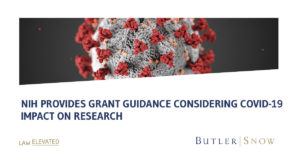On March 27, we published an updated version of this article. Read it here: https://www.butlersnow.com/2020/03/update-nih-provides-grant-guidance-considering-covid-19-impact-on-research/
Recognizing the impact that COVID-19 can have on research and the NIH grant application process, the NIH has issued 5 pieces of guidance between March 9 and 16, 2020 addressing various impacts of COVID-19 on NIH research grants.
Proposal Submission & Award Management
- NIH Late Application Policy Due to Public Health Emergency for United States for 2019 Novel Coronavirus (COVID-19) – NOT-OD-20-082 – This guidance allows for the late submission of grant applications to be considered on a case-by-case basis when COVID-19 measures make on-time submission difficult if the application is submitted as soon as possible with a cover letter detailing the reason for the delay. Advance permission to submit a delayed application is not required.
- General Frequently Asked Questions (FAQs) – Proposal Submission and Award Management Related to COVID-19 – NOT-OD-20-083 – This guidance includes a number of questions and answers related to how COVID-19 affects awards, including guidance that awardees of NIH funds for conference attendance should contact conference organizers to ensure conferences are occurring and in what format before attending, that NIH at the time of issuance of NOT-OD-083 did not yet have a decision as to whether it will still reimburse non-cancelable travel costs, and some grant applications may be submitted late in NIH’s discretion (see NOT-OD-20-082).
- Flexibilities Available to Applicants and Recipients of Federal Financial Assistance Affected by COVID-19 – NOT-OD-20-086 – This guidance explains administrative flexibilities for NIH applicants and recipients conducting research activities related to or affected by COVID-19. “Affected entities” are defined as entities that have been closed or COVID-19 precautionary measures or illness has hindered their business activities as appropriately documented.
- Pre-Award Costs – Affected applicants may incur pre-award costs from January 20, 2020 through the public health emergency period and prior to the date of a federal award.
- Extension of Post-Award Financial and Other Reporting – Financial and Research Progress Performance Reports (RPPR) of affected institutions may be made after the scheduled due date, although the institution should contact the assigned grants management and/or program official to let them know the reports will be late. Although late reports will be accepted, they will delay issuing grant awards.
- Prior Approval Requirement Waivers – In some instances, recipients may carry forward unobligated balances on active grants to support activities related to or affected by COVID-19 and for some grants, the final budget period may be extendable for up to 12 months.
- Cost Related Flexibilities/Expenditure of Award Funds
- Salaries: If researchers are paid per institution policy when unable to work because of COVID-19, charges to NIH grant awards are allowable.
- Stipends: Fellows and trainees unable to work because of or related to COVID-19 may continue to be paid stipends per institutional policy.
- Travel: If travel is cancelled due to COVID-19, otherwise allowable non-cancelable travel costs may be charged to the NIH award.
- Conference Registration Fees: If conferences, symposiums or seminars are cancelled for COVID-19, then otherwise allowable non-refundable associated registration fees may be charged to the NIH award.
- NIH-Supported Meetings and Conferences: Scientific meetings, conferences and workshops supported by NIH funding may be delayed or cancelled due to COVID-19. See the notice for details.
- Extension of Closeout – Closeout reports may be delayed by up to a year upon notice to the agency for recipients affected by COVID-19.
- Extension of Single Audit Submission – Single Audit reports may be delayed by up to a year for recipients directly affected by COVID-19.
Human Subjects & Clinical Trials
- Guidance for NIH-funded Clinical Trials and Human Subjects Studies Affected by COVID-19 – NOT-OD-20-087 – This guidance details flexibilities available to recipients conducting NIH-funded clinical trials and human subject studies, that are impacted by COVID-19. The safety and welfare of human subject participants and research staff is identified as of primary concern and suggestions are made for their protection including the following examples:
- Limiting study visits to those needed for participant safety or coincident with clinical care.
- Conducting virtual study visits
- Arranging flexibilities for required laboratory tests or imaging needed for safety monitoring to occur at local laboratories or clinics
- Canceling large gatherings of 50 or more people
- Limiting or suspending unnecessary travel
It is acknowledged that recipients may extend their approved project’s final budget period one time for up to 12 months without requesting prior approval from NIH. Additional extensions, including mid-project period extensions may be allowed by contacting the awarding institute or center. The usual seven-year cap on clinical trials and other human subjects research can be extended as necessary to accommodate for COVID-19 effects on project timing.
Unanticipated costs identified due to the impacts of COVID-19 may be requested via administrative supplement submitted to the awarding institute or center. Examples of such unanticipated costs are as follows:
- Costs incurred to arrange for participants to receive care at their local sites or virtually, rather than the study site, for required visits.
- Supply chain disruptions
- Personnel disruptions due to illness or closure of facilities
- Additional lab testing (e.g. for COVID-19)
- Increased transportation costs
Animal Welfare
- Flexibilities for Assured Institutions for Activities of Institutional Animal Care and Use Committees (IACUCs) Due to COVID-19 – NOT-OD-20-088 – This guidance allows for flexibility in the conduct of semi-annual facility inspections and IACUC meetings including adjusting timing, reducing the number of people required to be present for certain facility inspections where physical presence is necessary, and having meetings remotely, such as teleconference or video conference meetings if face-to-face format is not essential to the purpose of the meeting.
Peer Review
- Based on NIH Guidance on Travel and Meetings, in-person NIH peer review meetings are being held in alternate formats. Scientific review officers will be in contact with peer reviewers about these changes.
Additional guidance from the NIH surrounding COVID-19 impacts on NIH-funded research is available here: https://grants.nih.gov/grants/natural_disasters/corona-virus.htm.
